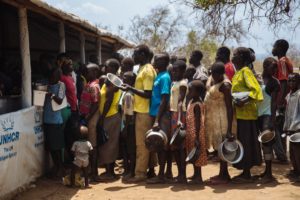Global refugee response being put to the test
Last year’s high-level summit in New York established principles of international cooperation and responsibility-sharing among states to address the global refugee crisis.
The “Comprehensive Refugee Response Framework”, outlined in an annex to the New York Declaration, is to form the basis for a global compact on refugees due to be adopted by member states in 2018.
One of its aims is to ease pressure on host countries; another is to expand access to resettlement in third countries. But solidarity from the international community is lagging far behind the commitments made in New York.
And now that approach is being put to the test as on the ground in Uganda as the east African nation struggles to respond to the world’s fastest growing refugee influx.
Uganda is failing to secure the help it needs to care for those forced across the border from South Sudan by war and hunger
Almost a million South Sudanese refugees, 86 percent of them women and children, have settled in northern Uganda as a result of the crisis. On average, 2,000 people arrive each day.
The unprecedented mass influx is putting an enormous strain on Uganda’s already limited public services, and fragile local resources like land, firewood, and water. That, in turn, is fanning tensions between the refugees and host communities.
The international community is struggling to respond to a crisis of this scale. In June, Uganda and the UN appealed for $2 billion to support the country’s total refugee caseload of 1.3 million for the next four years. Just $350 million has been raised so far.
That same month, the World Food Program (WFP) cut its rations to refugees by 50 percent and warned of further cuts to come. The WFP needs $US117 million for the next six months, but has a $US65 million funding gap.
Uganda has been praised internationally for its policy of hosting refugees in which refugees do not live in camps but looser settlements, and have the right to work and access social services.
The country has become one of the key testing grounds for a new global compact – the “Comprehensive Refugee Response Framework”.
The initiative is meant to ease the pressure on host countries, but the disappointing level of funding suggests that there are challenges ahead.
A UN report says that Uganda spent over $US323 million in 2016/17 on the protection and management of refugees, and on the provision of essential services. That’s equivalent to 46 percent of the country’s annual education budget and 62 percent of its health expenditure.
But there are shortages across the board for the refugees encamped in five vast northern provinces.
At a fundraising summit in Entebbe in June, Uganda and the UN appealed for $2 billion to assist the country’s emergency response to the influx from South Sudan as well as to fund the longer-term, more sustainable response.
But donor governments pledged just $350 million.
Now the disappointing outcome of the summit has raised questions about the future of the CRRF and the global compact and how the new framework can be implemented in other countries with less progressive refugee policies than Uganda’s.
Laurie Nowell
AMES Australia Senior Journalist












